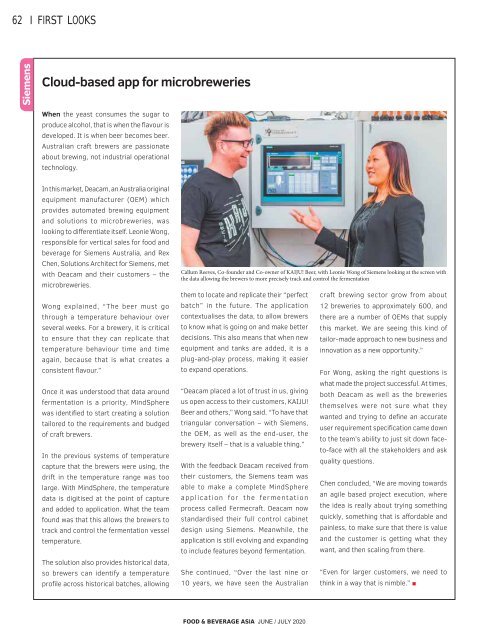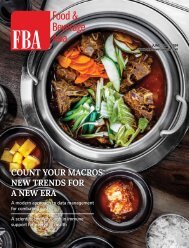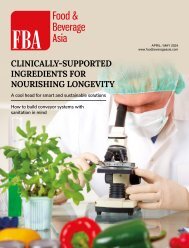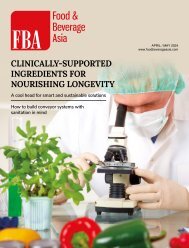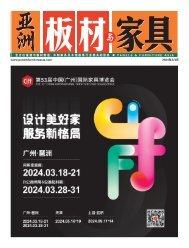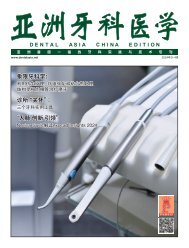Food & Beverage Asia June/July 2020
Food & Beverage Asia (FBA) is the leading source of food and beverage news in Asia since 2002. FBA delivers a comprehensive view of the food and beverage landscape, spanning across the latest health and nutrition trends and industry innovations in ingredients, recipe formulations, food science, sustainability, packaging, and automation, as well as advancements in agri and food-tech.
Food & Beverage Asia (FBA) is the leading source of food and beverage news in Asia since 2002. FBA delivers a comprehensive view of the food and beverage landscape, spanning across the latest health and nutrition trends and industry innovations in ingredients, recipe formulations, food science, sustainability, packaging, and automation, as well as advancements in agri and food-tech.
You also want an ePaper? Increase the reach of your titles
YUMPU automatically turns print PDFs into web optimized ePapers that Google loves.
62 FIRST LOOKS<br />
Siemens<br />
Cloud-based app for microbreweries<br />
When the yeast consumes the sugar to<br />
produce alcohol, that is when the flavour is<br />
developed. It is when beer becomes beer.<br />
Australian craft brewers are passionate<br />
about brewing, not industrial operational<br />
technology.<br />
In this market, Deacam, an Australia original<br />
equipment manufacturer (OEM) which<br />
provides automated brewing equipment<br />
and solutions to microbreweries, was<br />
looking to differentiate itself. Leonie Wong,<br />
responsible for vertical sales for food and<br />
beverage for Siemens Australia, and Rex<br />
Chen, Solutions Architect for Siemens, met<br />
with Deacam and their customers – the<br />
microbreweries.<br />
Wong explained, “The beer must go<br />
through a temperature behaviour over<br />
several weeks. For a brewery, it is critical<br />
to ensure that they can replicate that<br />
temperature behaviour time and time<br />
again, because that is what creates a<br />
consistent flavour.”<br />
Once it was understood that data around<br />
fermentation is a priority, MindSphere<br />
was identified to start creating a solution<br />
tailored to the requirements and budged<br />
of craft brewers.<br />
In the previous systems of temperature<br />
capture that the brewers were using, the<br />
drift in the temperature range was too<br />
large. With MindSphere, the temperature<br />
data is digitised at the point of capture<br />
and added to application. What the team<br />
found was that this allows the brewers to<br />
track and control the fermentation vessel<br />
temperature.<br />
The solution also provides historical data,<br />
so brewers can identify a temperature<br />
profile across historical batches, allowing<br />
Callum Reeves, Co-founder and Co-owner of KAIJU! Beer, with Leonie Wong of Siemens looking at the screen with<br />
the data allowing the brewers to more precisely track and control the fermentation<br />
them to locate and replicate their “perfect<br />
batch” in the future. The application<br />
contextualises the data, to allow brewers<br />
to know what is going on and make better<br />
decisions. This also means that when new<br />
equipment and tanks are added, it is a<br />
plug-and-play process, making it easier<br />
to expand operations.<br />
“Deacam placed a lot of trust in us, giving<br />
us open access to their customers, KAIJU!<br />
Beer and others,” Wong said. “To have that<br />
triangular conversation – with Siemens,<br />
the OEM, as well as the end-user, the<br />
brewery itself – that is a valuable thing.”<br />
With the feedback Deacam received from<br />
their customers, the Siemens team was<br />
able to make a complete MindSphere<br />
application for the fermentation<br />
process called Fermecraft. Deacam now<br />
standardised their full control cabinet<br />
design using Siemens. Meanwhile, the<br />
application is still evolving and expanding<br />
to include features beyond fermentation.<br />
She continued, “Over the last nine or<br />
10 years, we have seen the Australian<br />
craft brewing sector grow from about<br />
12 breweries to approximately 600, and<br />
there are a number of OEMs that supply<br />
this market. We are seeing this kind of<br />
tailor-made approach to new business and<br />
innovation as a new opportunity.”<br />
For Wong, asking the right questions is<br />
what made the project successful. At times,<br />
both Deacam as well as the breweries<br />
themselves were not sure what they<br />
wanted and trying to define an accurate<br />
user requirement specification came down<br />
to the team’s ability to just sit down faceto-face<br />
with all the stakeholders and ask<br />
quality questions.<br />
Chen concluded, “We are moving towards<br />
an agile based project execution, where<br />
the idea is really about trying something<br />
quickly, something that is affordable and<br />
painless, to make sure that there is value<br />
and the customer is getting what they<br />
want, and then scaling from there.<br />
“Even for larger customers, we need to<br />
think in a way that is nimble.” ■<br />
FOOD & BEVERAGE ASIA JUNE / JULY <strong>2020</strong>


